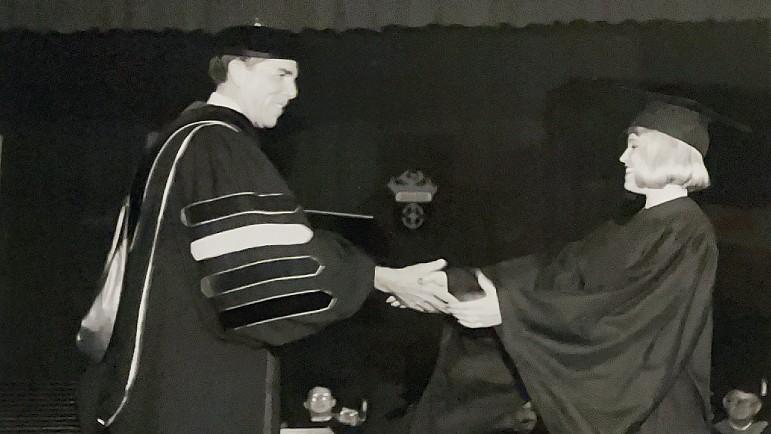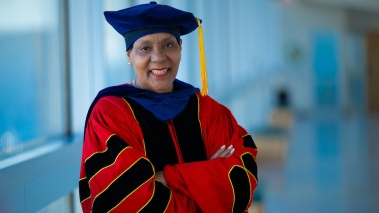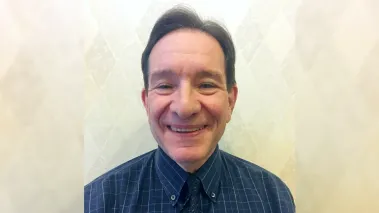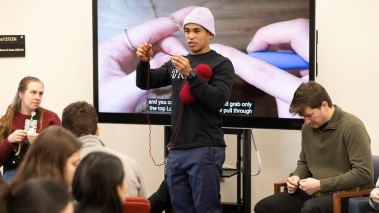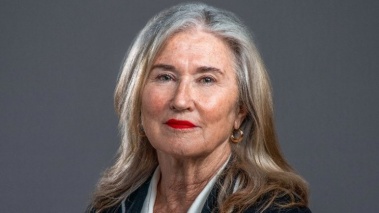Mary Katherine Krause, MS ’94, and her family have had quite a run at Rush University.
Growing up, she regularly went jogging with her father, Roger C. Bone, MD, former dean of Rush Medical College. She learned life-shaping lessons from her father during those cherished runs, and they helped her excel as a health systems management student at the College of Health Sciences and a longtime leader at RUSH University.
As RUSH celebrates the University’s 50th anniversary, Krause recently talked about her family’s contributions, as well as her time as a student and establishing the Mary Katherine Krause Endowed Student Career Development Fund for Professional Skills and Resources.
Talk about your parents’ involvement with Rush University.
Mary Katherine Krause: My father was recruited in 1983 to be the chairperson of the Department of Internal Medicine at Rush. I was 16 years old, and we moved from Little Rock, Arkansas to Chicago in the middle of January 1984. It was shocking. We drove a caravan of cars across the Midwest with me in the middle driving an older car, my father driving the lead car with the dog and my mother driving the last car with my little sister and the cat.
My father was very involved with the University. In addition to his clinical and administrative duties, he taught and conducted research. He eventually became dean of Rush Medical College and vice president of Medical Affairs. He mentored Michael Davidson, who started the Chicago Center for Clinical Research. Before my father passed away, Rush established an endowed chair in his honor in 1997 through Michael Davidson’s appreciation for him and the success of the center. Richard Byrne is currently the Roger C. Bone, MD, Presidential Professor.
My mother, Rosemary, was a registered nurse and funded my father through medical school. She has always volunteered at RUSH, starting with volunteering with the RUSH University faculty wives in the Rush University bookstore, where they also donated to scholarships for RUSH University students. My mother has been on the Rush University Woman's Board for years.
What was it like growing up with a father who played such a significant role at Rush University?
MKK: People would be surprised that my father was really goofy at home. When I was 10 years old, I started jogging with him after he got home from the hospital. That was his time to decompress. We became close during those runs as we shared the scenery, silly moments and songs out loud. I liked hearing everything he did as a teacher, clinician and administrator at the University.
He was the host of a Lifetime Medical Television show called “Internal Medicine Update.” We all watched him, including my paternal grandmother, and it was like he was there with us. I learned how to present myself by observing his many presentations and TV appearances. I watched how he interacted with people and learned a lot of soft skills related to working with people. I also learned by listening to my parents talk about my father’s day at work, about tact and diplomacy, professional presence and negotiation.
How did you make your way into health care administration?
MKK: I started out in college majoring in business and minoring in biology. I liked the business side of health care but didn’t know there was such a thing as health administration, so I switched my major to biology and decided to go full pre-med. That way, I had all the courses I needed if I wanted to go to medical school. And I still had all those business classes in case I wanted to get an MBA.
I took the MCAT and was ready to interview at medical schools because I thought that’s what my father might want me to do, but he really just wanted me to be happy. After graduating, I took a year off from school to work and figure out what I enjoy most and what to do next.
I took a position as a project coordinator at RUSH to build my resume. I was at the Rush University library one day and picked up the University course catalog, and I remembered coming across the Health Systems Management program. I read every word about every course and had a “hallelujah” moment. This is what I had been looking for but didn’t previously know what to call it.
What was your experience as a student in the Health Systems Management program like?
MKK: It was very busy and thrilling at the same time. I went to school while also working full-time at Rush, where I was taking on roles with more and more responsibility as an administrator. I would attend work meetings with some of my professors and see them in action. I had the opportunity to work with them directly and developed collegial relationships that I hold dear today. The training we received as students was very practical and could be put into action the very next day.
I'm proud to see how far our students go — so many become CEOs, presidents and partners. I think it's due to the operational training we experienced and the leadership examples we saw as students.
After graduating, you continued to build your career at the University and eventually led its first dedicated communications efforts. What was that experience like?
MKK: I got to experience the best in mentors along the way. Larry Goodman, who is now serving as University president for the second time, was my boss from 1993 to 1995. He was very patient with me as I was learning how to manage people and finances. He would meet with me weekly, listening and asking lots of questions about what I had done that week and say, “Great job. Next week, maybe you could try this.” And I did my best to implement his suggestions.
There was also Tom Deutsch, a past-dean of Rush Medical College and my boss from 2002 to 2007, and Lois Halstead, who was vice provost of the University and my boss from 2008-2012. They were very forward-thinking and proactive mentors to learn from. They were great listeners and role models.
In 2006, there was an opportunity for me to take on some communications tasks as Rush University was embarking on its reaccreditation, so I began to work closer with the Rush marketing department. In 2008, I developed the role of University Relations to focus on marketing the University. We were able to work on all kinds of fun initiatives, such as the campaign for the 40th anniversary of the University timed to the opening of the new Tower building. It was a critical milestone worth celebrating, just like the 50th anniversary is now.
It was really the first time we began to focus on giving the University more of a presence from a marketing standpoint. We created the University’s first student viewbook. We developed our first social media presence and student recruitment marketing campaigns. I’m pleased that marketing at the University continues to grow since I’ve moved on.
And you continue to teach in the Health Systems Management program.
MKK: I started doing some teaching in 1996. Laurel Burton was the chair of Department of Religion, Health and Human Values at the time and was teaching an ethics course. He allowed me to partner with him and let me teach a few parts of the lecture. I learned so much about teaching from him.
After that, I continued to help with courses in health systems management and across the University, such as professional skills, health care organization, marketing and strategic planning, and health care in America.
How would you say the Health Systems Management program and the University have changed over the years?
MKK: There has been tremendous growth. In my time at Rush, I’ve seen the Health Systems Management program go from a No. 25 ranking to No. 5 in U.S. News & World Report’s list of graduate schools, and the College of Nursing has some of the best programs in the country, as well as other programs within the College of Health Sciences.
I remember when Paul Carvey became the dean of the Graduate College. He developed a Master of Science in Biotechnology program that was really innovative because it recruited students who were preparing to either go on to medical school or lead the pharmaceutical and biotech industries.
Rush Medical College’s Community Service Initiatives Program began in 1991 as a student initiative when my father was the dean of Rush Medical College. I remember my father telling our family how impressed he was with the students who came into his office to pitch an innovative idea for creating community-based volunteer opportunities where students could get direct patient experience while providing access to care to people in need within our local community. The success of that program within Rush Medical College spurred the creation of many other community initiatives across the University, which I believe provided the foundation for what is now a community health equity and engagement program across the organization.
There have been so many outstanding milestones, and the University only continues to grow.
You have been a big part of the Rush University family over the years, and it has been a big part of yours. What is it about the University that makes you want to stay involved?
MKK: It’s vibrancy, strong culture and commitment to our mission. We’re always striving to innovate and to better serve our students, faculty, patients and community. The University makes such an important impact as a health sciences school, and that ultimately impacts the greater good: improving people’s health.
Also, my parents and I have all been treated for cancer at Rush University Medical Center. I’ve been cancer-free since 2007 thanks to my continuing care at Rush. That's a big reason I continue to teach and stay involved
I was excited to find a way to give back, creating a legacy for myself while I’m still relatively young and vibrant, by donating to make an impact on students’ lives. In 2019, I established the Mary Katherine Krause Endowed Student Career Development Fund for Professional Skills and Resources to support students in need who will be tackling the difficult job of leading hospitals, health systems and other health care organizations. Selected students will receive customized attention in applying the "soft skills" also needed to be successful, such as strategic influence, diplomacy, professional presence and gravitas.
I’m fortunate that my parents and mentors have helped me learn and hone these skills throughout my successful career. I want other alumni to know that if I can create a fund like this, they can too. My fund is quite humble and doable. Maybe it will grow to be like my father’s endowed chair with the help of other donors over time.
Setting up this fund has been very meaningful to me. It’s all in gratitude to the entire RUSH organization.
Mary Katherine Krause is the vice president for communications for the College of American Pathologists and has held a faculty role at RUSH’s College of Health Sciences for the past 27 years. She was associate vice president of University Relations at RUSH University from 2008-12 and associate vice president of Medical Affairs Administration for RUSH University Medical Center from 2002-07. From 1995-97, she was an assistant vice president of Medical Affairs.
Krause received the Health Systems Management program’s Distinguished Alumni Award in 2011 and has served on the University’s Career Services Committee for 16 years. She can be reached at marykatherinekrause@gmail.com.

